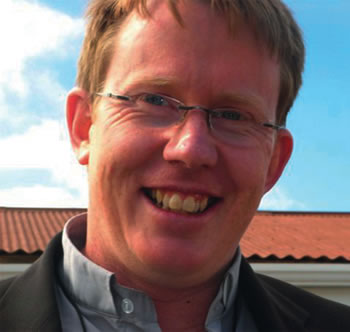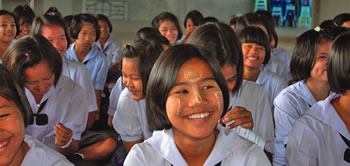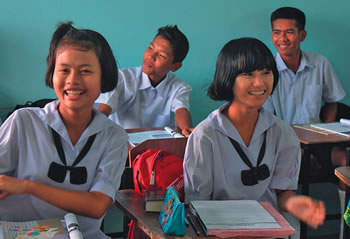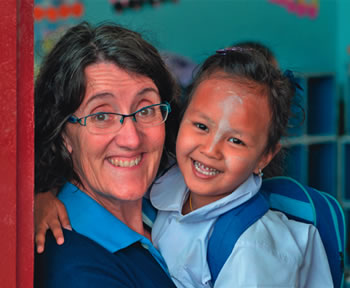Ranong
Marists on the Thailand-Burma border (2)
Mercy in Action
In last month’s article I wrote about the joy of living and serving in the Marist Mission among Burmese migrants on the Thailand-Burma border.
I think I have grown in Marist mercy coming here to the Thailand-Burma border. I have come to realise when you are really poor, you need to eat and have shelter, and then you can concern yourself with health. Education becomes the fourth luxury. We take all this for granted from our places of comfort in the developed world.
During the first few months in Ranong we learned that only 20% of Burmese migrant children begin school, 90% leave at twelve years of age to go to work, and there was basically no education for those older than twelve.
When he arrived in Ranong Fr John Larsen sm came across a small tin shed with some students trying to learn. A young Muslim girl, a little afraid of seeing her first ‘foreigner,’ but determined to share her dream, said with great conviction ‘I want to be a doctor.’ This was a moment of realisation that we could promote leadership and development for the migrant community.
The challenge was that 90% of Burmese children over the age of twelve were leaving school. Their bodies were big enough to work, but this continued the cycle of poverty, because without secondary education there can be no teachers, translators, or leaders for the Burmese community. Without education children become mothers and fathers stuck on $8 a day for life.

A number of our Preschool Programme Children are from neighbouring charcoal factories. Education will give them a brighter future.
The small secondary school programme we began has grown so that it now provides four years of secondary education for 95 students. As a teacher it is very humbling to see how much the students love to come to school. They wait outside the staffroom to carry your books to the classroom. They stand and bow in greeting when you arrive.
In Burmese and Buddhist culture a teacher is placed alongside monks and parents. Because education brings life, a teacher is seen as someone caring for and developing students’ lives.
As Fr Kevin Medilo sm frequently shares with visitors and volunteers to our project, ‘every student in the classroom is an incredible success.’ Each child has a beautiful and sad story of trying desperately to overcome many obstacles to come to school. We try our best to support poor families struggling with transport and tuition costs.
We try our best because poverty and no education have dreadful side effects. Desperation leads to prostitution in order to survive, or to husbands away on fishing boats for 3 to 6 months.
Possibly the most abandoned in our area are people living with HIV AIDS. They are often very lonely, having been rejected by their families. They struggle to get medicine and to understand what is happening to their bodies. The HIV AIDS Health Project was our first ministry and continues today with 75 patients and their families.
Imagine everyone rejecting you. Your parents, husband or wife, the whole community ignorant and afraid of you because of your ‘condition,’ being too sick to work, being kicked out of your home because the landlord is superstitious and thinks someone dying of AIDS is bad luck for him and his ‘house.’
The small secondary school programme we began has grown so that it now provides four years of secondary education for 95 students
We visit these friends daily and I feel traumatised to see the poverty in which they live and am moved by the welcome they give us. Recently an HIV patient commented, ‘when you visit you make me feel alive and loved.’




 Entries(RSS)
Entries(RSS)